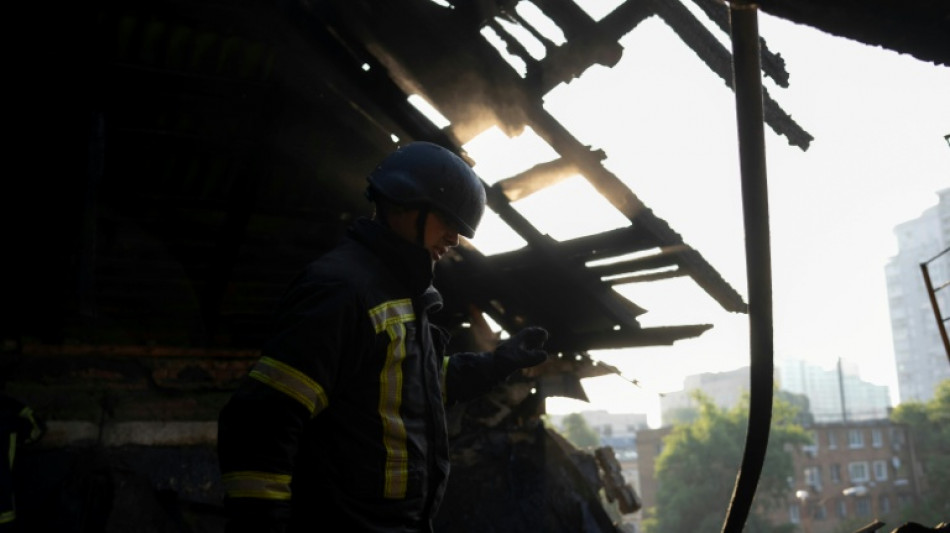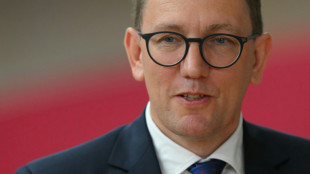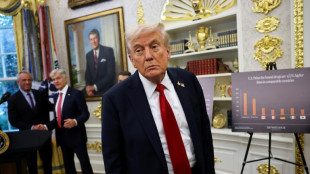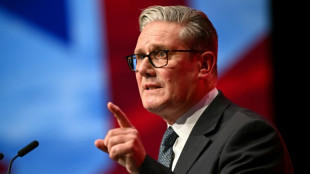
Trump says Ukraine should not target Moscow

US President Donald Trump said Tuesday that Ukraine should not target Moscow, after the Kremlin charged that a new US plan to supply weapons to Kyiv along with sanctions threats against Russia would delay peace efforts.
Trump on Monday gave Russia 50 days to strike a peace deal with Ukraine, voicing exasperation with Moscow, and announcing that NATO members would supply Kyiv with new military aid.
In what would be an even more extraordinary shift, the Financial Times reported that Trump spoke to Ukrainian President Volodymyr Zelensky about providing US missiles to hit Moscow.
But asked by reporters at the White House if Zelensky should look at striking the Russian capital, Trump replied: "No, he shouldn't target Moscow."
Trump had taken office vowing to end the conflict swiftly and to stop the flow of billions of dollars of US weapons to Ukraine.
The Republican put heavy pressure on Zelensky and initially touted his relationship with Russian President Vladimir Putin.
Under pressure from Trump, Moscow and Kyiv opened talks on the conflict, which has ground on for more than three years, but the only concrete result has been prisoner exchanges.
Russia has rejected calls for a ceasefire and launched a record number of drones and missiles at Ukraine in recent months.
Moscow said it needed more time to respond fully to Trump's Monday announcement, but suggested it was not conducive to diplomacy.
"It seems that such a decision made in Washington and in NATO countries and directly in Brussels will be perceived by Kyiv not as a signal for peace but for the continuation of the war," Kremlin spokesman Dmitry Peskov told reporters.
"President Trump's statement is very serious. We certainly need time to analyze what was said in Washington," he told reporters in Moscow's first reaction to the comments.
Trump warned that if no deal was concluded, he would slap severe tariffs on Russia's remaining trade partners in a bid to impede Moscow's ability to finance its military offensive.
Pumped up by huge state spending on soldiers and weapons, as well as by redirecting vital energy exports to the likes of China and India, Russia's economy has so far defied US and EU attempts to push it into a deep recession through sanctions.
- Burden on Europe? -
Most European allies have cheered the return of a hard US line, although Slovakia, led by Moscow-friendly populist Robert Fico, has resisted new EU sanctions on Russia.
But EU foreign policy chief Kaja Kallas also called for the United States to help fund the new weapons.
"We welcome President Trump's announcement to send more weapons to Ukraine, although we would like to see US share the burden," Kallas said after a meeting of EU foreign ministers in Brussels.
"If you promise to give the weapons, but say that it's somebody else who is going to pay for it, it is not really given by you."
Trump has been pushing allies to step up defense spending -- and to buy from US manufacturers -- and has long said the United States shoulders too much of NATO's burden.
Denmark, the Netherlands and Sweden -- which joined NATO after Russia sent troops into Ukraine in 2022 -- all said they wanted to participate in Trump's plan.
Sweden's Defense Minister Pal Jonson in a statement to AFP said his country "would contribute" and said Ukraine was in "great need of more air defense," given Russia's "constant bombings and attacks."
- 'Game of chess' -
Tens of thousands have been killed since Russia launched its offensive, with millions forced to flee their homes in eastern and southern Ukraine, which has been decimated by aerial attacks and ground assaults.
In Moscow, residents dismissed Trump's statement as little more than politics.
"It's a game of chess," Svetlana, an aviation engineer said.
Trump "gave 50 days, and then there will be more... We are waiting for the next move of our president," the 47-year-old said.
Ukrainian soldiers fighting in the east were hopeful but cautious about Trump's position.
"I don't believe him. There have been too many promises that haven't been kept," said one soldier with the call sign "Shah."
Others were worried it might be too little, too late.
"Of course it's good, but at the same time, time has been lost. Those Patriots could have been sent sooner and could have helped a lot," another fighter called "Master" told AFP.
Ruslan, a 29-year-old soldier, said: "If there is even the slightest chance to improve the situation for us and worsen it for them, then that's already positive."
O.R.Lucchese--INP

 London
London

 Manchester
Manchester
 Glasgow
Glasgow
 Dublin
Dublin
 Belfast
Belfast
 Washington
Washington
 Denver
Denver
 Atlanta
Atlanta
 Dallas
Dallas
 Houston Texas
Houston Texas
 New Orleans
New Orleans
 El Paso
El Paso
 Phoenix
Phoenix
 Los Angeles
Los Angeles



